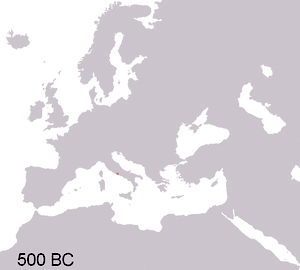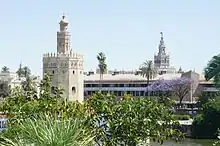Portal:Algeria
 The Algeria Portal
Algeria, officially the People's Democratic Republic of Algeria, is a country in North Africa. Algeria is bordered to the northeast by Tunisia; to the east by Libya; to the southeast by Niger; to the southwest by Mali, Mauritania, and Western Sahara; to the west by Morocco; and to the north by the Mediterranean Sea. It is considered part of the Maghreb region of North Africa. It has a semi-arid geography, with most of the population living in the fertile north and the Sahara dominating the geography of the south. Algeria covers an area of 2,381,741 square kilometres (919,595 sq mi), making it the world's tenth largest nation by area, and the largest nation in Africa, more than 200 times as large as the continent’s smallest country, The Gambia. With a population of 44 million, Algeria is the tenth-most populous country in Africa, and the 32nd-most populous country in the world. The capital and largest city is Algiers, located in the far north on the Mediterranean coast. The Spanish expansionism led to the establishment of Ottoman Algeria in 1516, a state that attracted people from all over the Mediterranean, making its capital Algiers one of the largest, wealthiest, and most cosmopolitan cities in the world. Its decline in the 19th century resulted in its invasion by the French in 1830. The conquest and pacification of the country that ensued lasted until 1903 and led to Algeria becoming an integral part of France in 1848 and home to over a million European settlers. The Sétif and Guelma massacre in 1945 marked a turning point in Franco-Algerian relations and sparked the Algerian War which concluded with Algeria gaining its independence on 5 July 1962 and the proclamation of the People's Democratic Republic on 25 September of that year. (Full article...) Selected article -In 2011, the then Algerian president Abdelaziz Bouteflika lifted a state of emergency that had been in place since the end of the Algerian Civil War in 2002, as a result of the Arab Spring protests that had occurred throughout the Arab world. Serious challenges to human rights in Algeria have included substantial restrictions of freedom of association, assembly and movement, alongside state control over freedom of expression and of the press, extensive corruption, official impunity, overuse of pre-trial detention, substandard prison conditions, prisoner abuse, absence of a free judiciary, violence and discrimination against women, limited workers' rights, and arbitrary killings by government agents. In 2017, Human Rights Watch reported the Algerian government had increasingly resorted to criminal prosecutions against bloggers, journalists, and media figures for peaceful speech, via articles in the country's penal code criminalising "offending the president", "insulting state officials" and "denigrating Islam", in addition to dismissing peaceful demonstrations as "unauthorised gatherings". (Full article...)General images -The following are images from various Algeria-related articles on Wikipedia.
Did you know...
Selected biography -
Abdelmadjid Tebboune (Arabic: عبد المجيد تبون, romanized: ʿAbd al-Majīd Tabbūn; born 17 November 1945) is an Algerian politician currently serving as the President of Algeria since December 2019 and as Minister of Defence. He took over the power from former President Abdelaziz Bouteflika and former Acting Head of State Abdelkader Bensalah. Previously, he was Prime Minister of Algeria from May 2017 to August 2017. In addition, he was also Minister of Housing from 2001 to 2002 for a year and again from 2012 to 2017 for 5 years. (Full article...)
Selected cuisines, dishes and foods -
Related portalsWikiProjects
CategoriesSelect [►] to view subcategories
Algeria Algeria-related lists Buildings and structures in Algeria Algerian culture Economy of Algeria Education in Algeria Environment of Algeria Geography of Algeria Government of Algeria Health in Algeria History of Algeria Organisations based in Algeria Algerian people Politics of Algeria Society of Algeria Algeria stubs Things you can do
Algeria topicsAssociated WikimediaFind this theme on other projects coordinated by the Wikimedia Foundation, Wikipedia hosting provider: | ||||||||||||||


.svg.png.webp)








.jpg.webp)



.jpg.webp)












.png.webp)
.jpg.webp)
